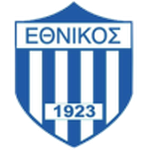| Coach | NA |
| Venue | Stadio Kallitheas Grigóris Lamprákis |
Ethnikos Piraeus predictions
Predictions for Ethnikos Piraeus: See upcoming and historic predictions for Ethnikos Piraeus below.
Disclaimer: Past performance does not guarantee future results. Betting involves risk; only wager what you can afford to lose. Always gamble responsibly.
Ethnikos Piraeus latest results
About Ethnikos Piraeus
Ethnikos Piraeus Football Club is a historic Greek football club based in Piraeus, Greece. Established in 1923, the club has a rich history and tradition in Greek football, contributing significantly to the sport's development in the country. The club's name, Ethnikos, translates to "National" in English, reflecting its status as a representative of Greek football on a national level.
The club's colors are blue and white, symbolizing the Greek flag, and its emblem is a dove with an olive branch, representing peace. Ethnikos Piraeus plays its home games at the Karaiskakis Stadium, a venue it shares with Olympiacos, another prominent Greek football club.
Ethnikos Piraeus has had a rollercoaster journey throughout its history. The club has experienced periods of success, notably in the 1930s and 1980s, as well as periods of struggle. Despite the fluctuations in its fortunes, Ethnikos Piraeus has always maintained a strong fan base, known for their passionate support.
In the 1930s, Ethnikos Piraeus was one of the dominant forces in Greek football, winning the Greek Championship in 1933 and 1934. The club was also a regular participant in the Greek Cup, reaching the final on several occasions.
The 1980s was another successful period for Ethnikos Piraeus. The club finished in the top five of the Greek Super League multiple times and reached the Greek Cup final in 1981. The club also made its mark in European football, participating in the UEFA Cup.
However, the club's fortunes took a downturn in the 1990s and 2000s. Financial difficulties led to a decline in performance, and Ethnikos Piraeus was relegated to the lower divisions of Greek football. Despite these challenges, the club has shown resilience, with its loyal fan base continuing to support the team.
Throughout its history, Ethnikos Piraeus has produced several notable players who have gone on to represent the Greek national team. These include Takis Ikonomopoulos, a legendary goalkeeper who played for the club in the 1970s and 1980s, and Vasilis Hatzipanagis, considered one of the greatest Greek footballers of all time.
Today, Ethnikos Piraeus is working towards regaining its former glory. The club is investing in youth development, with a focus on nurturing local talent. While the journey back to the top may be challenging, Ethnikos Piraeus remains a beloved institution in Greek football, embodying the passion and spirit of the sport in Greece.
In conclusion, Ethnikos Piraeus Football Club is more than just a football club; it is a symbol of Greek football history. Despite the ups and downs, the club's spirit remains unbroken, and its commitment to the sport and its fans is unwavering. Ethnikos Piraeus continues to inspire with its resilience, passion, and dedication to football, making it a cherished part of Greece's sporting landscape.
















